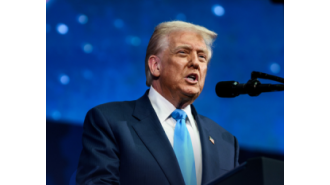Trump plans to impose tariffs on Mexico, China, and Canada in response to their trade policies.
Trump plans to implement tariffs on Mexico, Canada and China this Saturday, with the rates ranging from 10% to 25%.

President Donald Trump has been making headlines with his plans to impose tariffs on Mexico, Canada, and China, which are set to go into effect this Saturday. In a recent announcement, Trump stated that he will be imposing a 25% tariff on imports from Mexico and Canada, starting tomorrow. This decision comes as a way to pressure these countries into taking action against the influx of migrants and fentanyl into the US.
Not stopping there, the president also revealed his plans to add a 10% tariff on imports from China. During a press conference on Friday, Trump explained his reasoning, stating that China is producing fentanyl and distributing it through Mexico and Canada, causing harm to the US. He went on to say that all three countries have not been treating the US fairly.
As the president departed the White House on Friday, White House press secretary Karoline Leavitt confirmed that the tariffs are being implemented to retaliate against the illegal fentanyl that is being brought into the US. She added that this is yet another promise made and kept by President Trump.
When asked if there was anything Mexico and Canada could do to avoid the tariffs, Trump replied with a firm "no" and emphasized the power of tariffs in protecting the US economy. He also mentioned that Canadian oil imports may be subject to a lower tariff rate.
These decisions have sparked concerns among economists, who warn that tariffs on foreign goods could lead to higher prices for American consumers. Canada, being the largest foreign supplier of crude oil to the US, could see an increase in prices at the pump due to the tariff. Additionally, the US imports a significant number of cars and trucks as well as auto parts from Canada and Mexico, which could result in an average price increase of $3,000 for cars in the US, according to TD Economics.
The impact of these tariffs could also be felt in the grocery sector, with prices for certain products potentially skyrocketing. Despite Trump's criticism of the Biden administration for inflation and high food prices, many agricultural products in the US are actually imported. For example, 90% of avocados come from Mexico. Scott Lincicome from the Cato Institute expressed concern about the impact of tariffs on grocery stores, which operate on small profit margins and may not be able to absorb the additional costs. He also pointed out the potential impact on guacamole prices right before the Super Bowl.










